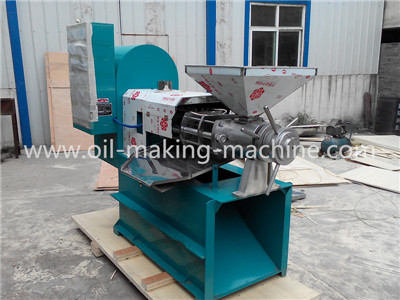
Author:Jintai网络部 Modified date:2024-4-1 8:09:51

In the bustling agricultural heartland of the Philippines, a groundbreaking innovation has taken root, transforming the landscape of oil production from sunflower seeds. The introduction of a state-of-the-art peanut oil press machine has not only bolstered local economies but also set a new standard for efficiency and sustainability in the industry.
Traditionally, extracting oil from sunflower seeds has been a labor-intensive process that often resulted in lower yields and quality. However, with the advent of the Philippine peanut oil press machine, farmers and manufacturers alike are experiencing a revolution in productivity. This technological marvel is designed to expel oil from the seeds with minimal loss and maximum purity, ensuring both quantity and quality are significantly improved.
The machine employs a unique cold-press technique that preserves the nutritional value of the sunflower seeds, including essential fatty acids, vitamins, and minerals. This method contrasts sharply with conventional high-heat extraction processes that can degrade delicate nutrients. As a result, the oil produced by the Philippine peanut oil press machine is not only richer in flavor but also boasts a more robust health profile, making it highly sought after in the health-conscious consumer market.
One of the most significant advantages of this machinery is its energy efficiency. It operates on a fraction of the power required by traditional presses, reducing carbon footprints and operational costs. This eco-friendly approach aligns with the global movement towards sustainable practices and has garnered praise from environmental advocates.

Furthermore, the design of the press machine is such that it can be easily adapted to different scales of operation. Small-scale farmers can benefit from a compact version, while larger enterprises can integrate more robust systems capable of handling higher volumes of seed input. This scalability ensures that the technology can be leveraged across various economic levels, fostering inclusive growth within the agricultural sector.
Another key feature of the Philippine peanut oil press machine is its user-friendly interface. The intuitive design allows for straightforward operation, reducing the need for extensive training or specialized labor. This aspect not only streamlines production but also empowers local communities to take control of their livelihoods by providing them with the tools to process their harvest effectively.
The impact of this technological advancement extends beyond the immediate benefits of increased yield and quality. The success of the Philippine peanut oil press machine has sparked interest among international investors, leading to potential collaborations and joint ventures. This influx of external interest could catalyze further technological advancements and open up new markets for Filipino agricultural products.
In conclusion, the advent of the Philippine peanut oil press machine represents a paradigm shift in the way sunflower seed oil is produced. Its ability to deliver superior quality oil while being environmentally friendly, energy-efficient, and user-friendly has made it a game-changer for the industry. As the Philippines continues to harness the potential of this innovative machine, the future looks bright for both local economies and the global market for healthy, sustainably produced oils.
Prev :
Sesame Oil Press Machine in Brunei: Creating Unprecedented Industries with a Determined Spirit
Next :
Together We Thrive: The Impact of Soybean Oil Press Machines on Agricultural Excellence in East Timor